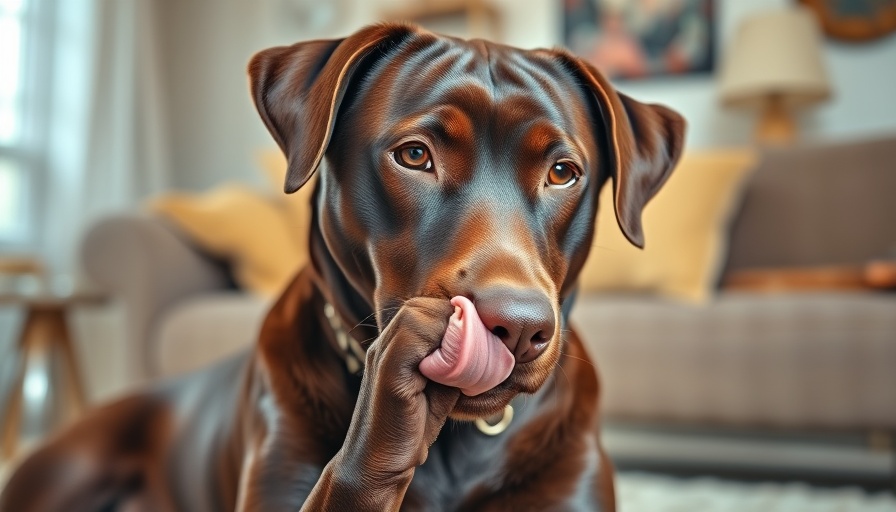
Understanding Why Dogs Lick Their Paws
Many dog owners often find themselves puzzled when they see their furry companions licking their paws over and over again. While occasional licking is normal—think of it as a doggie grooming routine—excessive licking can point to underlying issues that need attention. Various factors could be at play, ranging from allergies to infections, and understanding these can help owners know when to consult a veterinarian.
Common Reasons for Excessive Paw Licking
Veterinarians and pet experts often emphasize the importance of paying close attention to a dog's paw licking behaviors. An occasional lick or two after a walk can seem perfectly harmless, but persistent licking could suggest discomfort or anxiety. Let's delve into the most common reasons why dogs lick their paws excessively:
Allergies: Identifying Triggers
Food allergies are a prevalent cause of excessive paw licking. Ingredients like dairy, wheat, soy, and specific proteins can trigger allergic reactions in dogs. If you notice your pup licking their paws largely after meals, it might be time to rethink their diet. Additionally, environmental allergens like pollen, mold, and dust can also provoke an itch, prompting licking to soothe irritation.
Injuries: Spotting the Signs
Careful observation can reveal a lot about a dog's behavior. If they are fixated on one particular paw, there could be an injury. Look out for ice balls in the winter or irritation from hot pavement in the summer—these factors can lead dogs to lick persistently. If you observe swelling or signs of pain alongside the licking, consult your vet without delay.
Parasites: Prevention is Key
Parasites aren't just a nuisance; they can lead to significant discomfort that prompts dogs to lick their paws. Fleas, ticks, and mites are common culprits. Regular treatment for parasites is essential, especially for dogs that frequent parks or other areas where these pests are common.
Skin Problems: Keeping Their Skin Healthy
Fungal and bacterial infections can lead to itchy, irritated skin, prompting dogs to lick. This reaction often leads to hot spots, where licking further exacerbates the issue. To manage these conditions, consider using medicated shampoos and consult your vet for effective treatments. Keeping a healthy routine can minimize the chances of infections.
Paw Pain: Beyond Licking
Paw pain can stem from various sources—stepping on hot surfaces or various injuries can lead to a reluctance to walk. If paw licking is accompanied by limping or signs of pain, immediate veterinarian attention may be required.
Finding Solutions To Licking Problems
Once you've identified the reason for your dog's excessive licking, the next step is treatment. Depending on the underlying cause, solutions may include:
- Adjusting their diet and eliminating potential allergens.
- Implementing preventive care measures for parasites.
- Using topical treatments prescribed by your veterinarian for skin infections.
- Monitoring and managing injuries with appropriate treatments.
The Importance of Engaging with Experts
For veterinarians, vet technicians, and pet nutritionists, understanding the reason behind a dog's behavior is crucial. Engaging with a community of professionals helps foster knowledge and support among those who work with pets every day. Whether you're a trainer, groomer, or an advocate for pet care, sharing insights about common pet behaviors can elevate the overall welfare of animals.
Common Myths About Dogs and Paw Licking
Myth: Dogs lick their paws simply because they like the taste. Fact: While dogs might enjoy licking for sensory reasons, it often indicates anxiety, discomfort, or other health issues that warrant professional attention.
Conclusion: Be Proactive About Your Pet's Health
As engaging pet owners, it's essential to proactively manage your dog's health by understanding their behaviors. If your dog is licking their paws excessively, don't hesitate to reach out to a veterinarian or an animal behaviorist. Ensuring your dog's comfort—both physical and mental—will lead to a happier and healthier pet!
 Add Row
Add Row  Add
Add 




 Add Row
Add Row  Add
Add 


Write A Comment